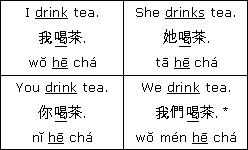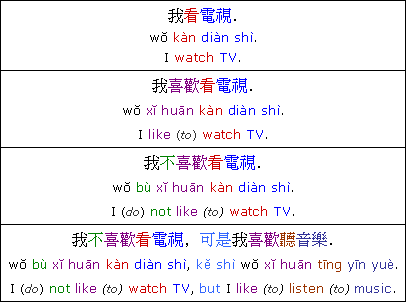




Once you begin studying Chinese grammar, you'll notice that verbs are not inflected in Chinese. In Spanish class you may have practiced "Yo tengo / Tu tienes / Él tiene / Nos tenemos" and so on, or "Ich habe / Du hast / Er hat / Wir haben" in German.
In Chinese, however, only one form of each verb exists. While this makes memorizing "conjugation tables" unnecessary, it does mean that word order is very important in Chinese sentences. Word order is often the only indication in Chinese to tell, so to speak, who is doing what to whom.
In normal Chinese declarative sentences, word order is the same as that of normal English declarative sentences, subject - verb - object, as this example shows:

That's easy enough, but what might seem strange at first is the absence in Chinese of "helping" words we have in English, such as the ‘to’ of infinitive verbs ("I want to go.") and articles ‘a’, ‘an’, and 'the’.
Before we get too confused with that idea, look at a couple more examples.

Notice
that both "I watch TV" and "I am watching TV" are translated
as . Chinese also
uses no helping verbs like 'am' and therefore doesn't differentiate grammatically
between 'watch' and 'am watching'.
To complete this illustration, let's build on this example until we have a full compound sentence. Spend some time with this one, and notice that the word order of Chinese parallels that of English at each step.

This doesn't mean, however, that every Chinese sentence will have the same structure as its direct English translation. We're only saying that a great many do.
Got it? Good.